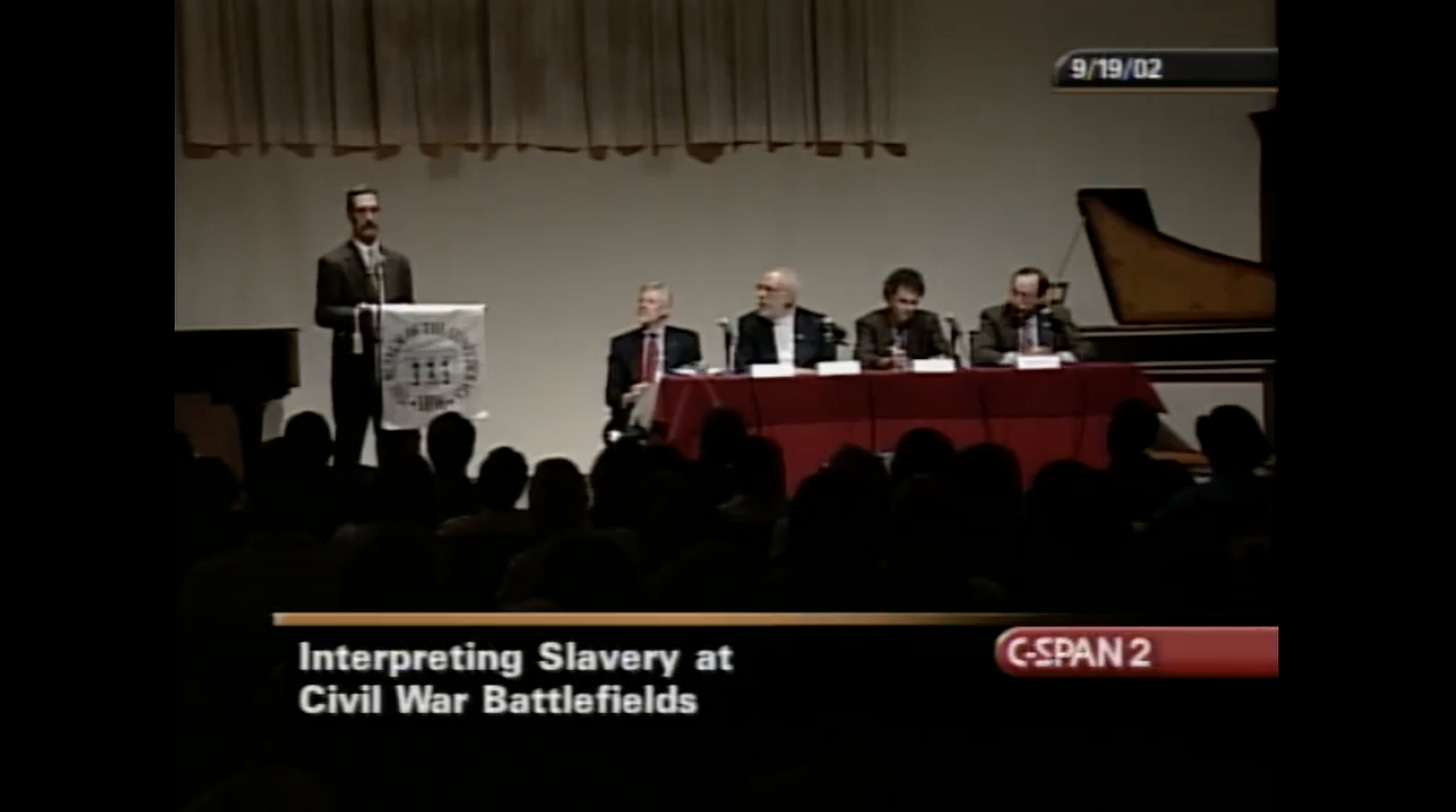I recently had the opportunity to revisit a panel discussion that took place at the University of Richmond way back in 2002. The panel featured Dwight Pitcaithley, Jerry Russell, Edward Ayers, Robert K. Krick and was moderated by John Coski. The topic was the question of whether the National Park Service should expand its interpretation of battlefield sites to include discussions of slavery.
A few years earlier Congressman Jesse Jackson, Jr. added language to an Interior Department appropriations bill directing the park service, “to encourage Civil War battle sites to recognize and include in all of their public displays and multimedia educational presentations the unique role that the institution of slavery played in causing the Civil War.”
In 2000 the park service held a symposium on the topic that brought together academic historians and public historians to begin to outline a new interpretive plan.
I attended the panel discussion in person in 2002. I had just started a master’s program in history at the University of Richmond and was beginning to really focus on questions of Civil War memory and public history. The discussion was riveting. I remember Ed Ayers being on fire that night and rewatching the panel confirmed it.
In hindsight it is clear that the concerns that expanding interpretation at battlefield sites ran the risk of politicizing history was all about nothing. This was no doubt fueled by the fact that it was a congressman who instigated the call for change, but it was clear that an interpretive shift had already been underway to one extent or another at individual parks.
Today no reasonable person questions whether you should learn something about slavery or the civilian experience when visiting a battlefield park. By the Civil War sesquicentennial, the National Park Service was well on its way to expanding its interpretation and integrating new scholarship into tours, museum exhibits, and wayside markers.
The evolution of interpretation over the past two decades has also been fueled by a new generation of public historians, who have been introduced to the latest scholarship and who have spent time reflecting on essential questions of how historic sites should be interpreted and why people still have a need to experience them in person.
Rather than politicizing the past, this new expanded interpretation helps visitors to better understand the events that took place on the landscape and why it matters.
We can certainly point to places where more work needs to be done, but the overall question of whether battlefield sites should raise these issues for visitors has been settled for good.
But I’ve been wondering about where we are headed and whether our battlefield parks and other historic sites related to the Civil War era will have to contend with another interpretive question of the same magnitude. Perhaps we have already arrived at an inflection point.
Historic sites do not exist in a vacuum cut off from the broader world. Their establishment in the 1890s had everything to do with the politics of the day and the overall culture.
The nation has gone through a lot since 2015. The “Black Lives Matter” movement has rallied the nation around the issue of racial violence and racial justice. Americans are in the midst of a bitter debate over history education and the broader question of how we as a nation think about and commemorate our shared past. Memory of a failed insurrection in D.C. lingers. The bitter public debate over Civil War monuments and the removal of hundreds of Confederate monuments continues.
Visitors to park sites bring this lived experience with them and interpret everything they experience through it.
We should celebrate the fact that historic sites, especially battlefields, now offer a much more sophisticated interpretation and wider range of programs for its visitors, but is it enough? What more, if anything, needs to be done to keep our historic sites relevant? I don’t have any easy answers.
What do you think?





Perfect timing: https://www.nationalparks.org/nps-mellon-humanities-postdoctoral-fellowship
"This event provides an opportunity for the NPS to tell a more inclusive story of the American past and present. The NPS is committed to exploring the full complexity of our history, even if that history is uncomfortable, contested, or erased. The humanities research supported by this Fellowship will expand these efforts, encouraging creative approaches to documentation, interpretation, and outreach."
I am a little surprised u haven’t received some comments on this post. The issues raised by the panel are about as salient as it is possible to get when considering interpretation of Civil War battlefields. I have always thought it very important that Americans understand that the conflict was a clash of competing visions for the United States and that one vision had at its core chattel slavery. Now I will add the vision that won did not do as well as it should have to insure equality for all, but it has been a lot better than the alternative